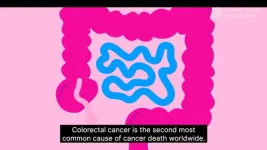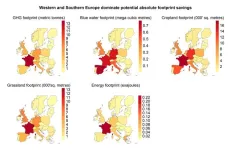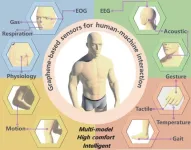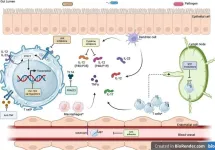(Press-News.org) Keeping an eye on the regions when it comes to climate change
Up to now, the results of climate simulations have sometimes contradicted the analysis of climate traces from the past. A team led by the physicist Thomas Laepple from the Alfred Wegener Institute in Potsdam and the climatologist Kira Rehfeld from the University of Tübingen has therefore brought together experts in climate models and climate tracks to clarify how the discrepancies come about. The surprising result has now been published in the journal Nature Geoscience: in a way, both sides are right. Climate models correctly simulate global temperature trends, but often underestimate the strength of regional climate fluctuations, especially over the course of decades to centuries.
In order to understand the causes and consequences of climate fluctuations, researchers examine climate archives, such as trees, lakes and marine sediments or even ice. Over the course of centuries and millennia, the climate has continuously varied, leaving behind traces. Understanding natural climate changes enables better assessments of what lies ahead with man-made climate change. Anticipating how humankind can prepare for the consequences of increasing global warming is of paramount importance. “We will feel the effects of climate change primarily regionally,” says physicist Prof. Dr. Thomas Laepple of the Alfred Wegener Institute Helmholtz Centre for Polar and Marine Research (AWI) in Potsdam. “In some regions, droughts will become more frequent, potentially leading to crop failures over extended periods. Elsewhere, we will witness more powerful hurricanes.”
The problem is that global climate models are often unable to represent regional variations in detail when projecting several centuries into the future. While they are good at accurately simulating the global warming trend, they still lack the ability to accurately simulate local conditions. This makes it difficult to plan and implement concrete measures to adapt to the climate - for example, in agriculture to switch at the right time to crops that can tolerate higher temperatures. Thomas Laepple and his colleagues already pointed out the problem of local predictive power about ten years ago: In an analysis of the climate evolution over the last 7000 years, they had then uncovered a striking discrepancy between global climate simulations on the one hand and local analysis of climate traces from centuries- or even millennia-old marine sediments, tree rings, pollen or corals. These indicators shed light on past temperatures in specific regions of the Earth. On a regional scale, climate simulations and sediment sample analyses differed in their temperature estimations, sometimes by a factor of 50, leading to controversial discussions among experts.
“At the time, we were faced with a conundrum,” recalls Thomas Laepple. “We couldn't say with certainty whether the climate models were incorrect in the selected examples or whether the temperature data derived from the sediment samples were based on faulty assumptions.” Subsequently, Thomas Laepple and climatologist Kira Rehfeld from the University of Tübingen successfully drew attention to this problem. Among other initiatives, workshops brought together experts in climate models and those who evaluate climate traces. Laepple and Rehfeld also collaborated with colleagues to establish the international working group CVAS (Climate Variability Across Scales), which delved into the discrepancy between regional and global scales in greater detail. Now, in collaboration with Kira Rehfeld and other colleagues, a review article has been published in the journal Nature Geoscience, highlighting these discrepancies. Co-authors also include students and workshop participants who contributed to the study through literature research and scientific illustrations. The most significant finding: in a sense, both sides are correct - the climate modeling experts and those who evaluate the climate traces. “We found that climate models are skillful at tracing past global temperature trends,” says Thomas Laepple. “However, the longer the time period you examine, the more regional deviations are averaged out. Trends in regional temperature values become overly smoothed.” One reason might be that global climate models do not account for various regional buffering phenomena - such as regional ocean currents that stabilize the climate in coastal regions for many years or even decades, even as the global average temperature changes.
“We are increasingly observing regional climate changes around the world - temperatures, for instance,” he notes. “There is a wide range. Some regions may experience a cooling for a few years, while others may see temperatures significantly higher than the global average, and abrupt shifts are also possible. It is crucial to bear this in mind when conducting risk assessments for climate adaptation.” He emphasizes the importance of understanding that several years of cooling in one region does not negate the reality of climate change. “The global trend of warming is unmistakable over decades - even if the climate in individual regions may deviate for a period.”
Original publication:
T. Laepple, E. Ziegler, N. Weitzel, R. Hébert, B. Ellerhoff, P. Schoch. B. Martrat, O. Bothe, E. Moreno-Chamarro, M. Chevalier, A. Herbert, K. Rehfeld: Regional but not global temperature variability underestimated by climate models at supra-decadal timescales; Nature Geoscience (2023). DOI: 10.1038/s41561-023-01299-9
END
Keeping an eye on the regions when it comes to climate change
2023-11-06
ELSE PRESS RELEASES FROM THIS DATE:
Abortion bans linked to increase in children entering foster system, researchers find
2023-11-06
BOSTON – In June 2022, the U.S. Supreme Court overruled Roe v. Wade, effectively ending 50 years of federal protections to abortion care. As of October 2023, twenty-six states have since enacted laws to ban or restrict abortion access, with 14 states completely banning the procedure. Today, an estimated 25 million American women of childbearing age, or about one third of women ages 15 to 45, live in areas where abortion care is severely restricted. Historically, many states were able to restrict access to abortion even before 2022 through Targeted Regulation of Abortion Providers (TRAP) laws; these laws decrease ...
A blood test shows MS worsening 1 to 2 years before it happens
2023-11-06
Multiple sclerosis patients whose blood tests reveal elevated NfL, a biomarker of nerve damage, could see worsening disability one to two years later, according to a new study spearheaded by researchers at UC San Francisco.
The study is the first to quantify the timeframe preceding disability worsening in which injury to the central nervous system takes place, said co-first author Ahmed Abdelhak, MD, of the UCSF Department of Neurology and the Weill Institute for Neurosciences.
Almost 1 million Americans ...
Major study validates Owkin’s best in class AI diagnostic for colorectal cancer biomarker aimed at optimizing patient access to immunotherapy
2023-11-06
Article in Nature Communications demonstrates that with 96% sensitivity, AI diagnostic MSIntuit™ CRC can rule out almost half of the MSS population of colorectal cancer patients unlikely to respond to checkpoint inhibitor therapy from additional screening.
Such AI-enabled solutions have the potential to improve lab efficiency, addressing global pathology shortages and reducing testing burden to match the right patients to the right therapies.
Paris and New York., 6 Nov 2023 – In a peer-reviewed study published today in Nature Communications, a team of scientists ...
Food waste prevention in Europe can generate major footprint savings
2023-11-06
New research shows that European food consumption draws unnecessarily excessively on global resources, which is why researchers are calling for political action. Many of the foods that are consumed in Europe are produced in countries outside Europe. Food loss – and waste later in the chain, (read more on waste terms below) – occurs along the food supply chain, from the primary agricultural sector in Europe or rest of the world, until it feeds mouths in Europe.
“Halving Europe’s food loss and waste, together with a redistribution of global food resources, could solve the challenges of food shortages in the ...
NIH grant expands UIC brain bank into citywide effort to study epilepsy, brain cancer
2023-11-06
A new virtual brain bank spanning five Chicago academic medical centers and led by University of Illinois Chicago will create a powerful new resource for clinical care and research on epilepsy, brain tumors and neurological disorders.
A $5 million grant from the National Institutes of Health will create a network of brain tissue research at UIC, Northwestern University, Lurie Children’s Hospital, Rush University and University of Chicago. The institutions will utilize a data platform developed at UIC called INTUITION that combines tissue data with clinical, functional, genetic and 3D imaging information to assist clinicians treating patients and help researchers better understand ...
Carbon-based sensors are poised to facilitate a seamless human-machine interface
2023-11-06
Interaction between machines and humans is paramount to the development of the new technologies of the metaverse, which are designed to augment the human experience through cloud computing and extended reality (XR). Graphene, a two-dimensional carbon material, has emerged as an ideal candidate for wearable sensor technology, paving the way for a new era of seamless human-machine interaction (HMI).
A team of material scientists led by Tian-Ling Ren from Tsinghua University in Beijing, China recently outlined the state of graphene-based HMI sensor technology ...
Chronic liver diseases: What new insights are there?
2023-11-06
Fatty liver diseases (FLD) have become a significant health concern worldwide, affecting millions. The two most common types of FLD are non-alcoholic fatty liver disease (NAFLD) and alcoholic-associated liver disease (ALD). NAFLD is associated with obesity, insulin resistance, and metabolic syndrome, while ALD is caused by excessive alcohol consumption. Both NAFLD and ALD can progress to liver fibrosis, cirrhosis, and, ultimately, hepatocellular carcinoma (HCC), a primary liver cancer with a poor prognosis.
Significant ...
Future therapies for managing inflammatory bowel disease
2023-11-06
Ulcerative colitis (UC) and Crohn's disease (CD) are chronic inflammatory bowel diseases (IBD) that affect the gastrointestinal tract. In recent decades, there have been significant advances in the understanding of IBD pathophysiology and the development of new treatments.
The International Organisation for the Study of Inflammatory Bowel Diseases (IOIBD) developed the Selecting Therapeutic Targets in Inflammatory Bowel Disease (STRIDE) programs, which recommend specific treatment goals for UC and CD in children ...
A joint research team from South Korea and the United States has identified a new gene classification system for gastric cancer
2023-11-06
- A multicenter study of the MD Anderson, Korea University, Yonsei University, and other institutions
- Establishing subtypes of gastric cancer classification to lay the foundation of personalized treatment
Professor Sang Cheul Oh of the Division of Oncology/Hematology, Department of Internal Medicine, Korea University College of Medicine, Professor Sang‑Hee Kang of the Department of Surgery, Korea University’s Guro Hospital, and Professor Sun Young Yim of the Division of Gastroenterology and Hepatology, Department of Internal Medicine, Korea University College of Medicine announced a new genetic classification system ...
MD Anderson Research Highlights: SITC 2023 Special Edition
2023-11-06
ABSTRACTS: 1534, 777, 1328, 1526, 1330, 545
HOUSTON ― The University of Texas MD Anderson Cancer Center’s Research Highlights provides a glimpse into recent basic, translational, and clinical cancer research from MD Anderson experts.
This special edition features oral presentations from the Society for Immunotherapy of Cancer (SITC) 38th Annual Meeting focused on scientific advances and breakthroughs in cancer immunotherapy from MD Anderson-led studies. Highlights include fecal microbiome transplants ...





